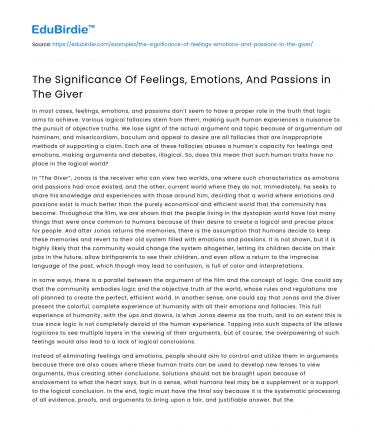In most cases, feelings, emotions, and passions don’t seem to have a proper role in the truth that logic aims to achieve. Various logical fallacies stem from them, making such human experiences a nuisance to the pursuit of objective truths. We lose sight of the actual argument and topic because of argumentum ad hominem, and misericordiam, baculum and appeal to desire are all fallacies that are inappropriate methods of supporting a claim. Each one of these fallacies abuses a human’s capacity for feelings and emotions, making arguments and debates, illogical. So, does this mean that such human traits have no place in the logical world?
In “The Giver”, Jonas is the receiver who can view two worlds, one where such characteristics as emotions and passions had once existed, and the other, current world where they do not. Immediately, he seeks to share his knowledge and experiences with those around him, deciding that a world where emotions and passions exist is much better than the purely economical and efficient world that the community has become. Throughout the film, we are shown that the people living in the dystopian world have lost many things that were once common to humans because of their desire to create a logical and precise place for people. And after Jonas returns the memories, there is the assumption that humans decide to keep these memories and revert to their old system filled with emotions and passions. It is not shown, but it is highly likely that the community would change the system altogether, letting its children decide on their jobs in the future, allow birthparents to see their children, and even allow a return to the imprecise language of the past, which though may lead to confusion, is full of color and interpretations.
Save your time!
We can take care of your essay
- Proper editing and formatting
- Free revision, title page, and bibliography
- Flexible prices and money-back guarantee
In some ways, there is a parallel between the argument of the film and the concept of logic. One could say that the community embodies logic and the objective truth of the world, whose rules and regulations are all planned to create the perfect, efficient world. In another sense, one could say that Jonas and the Giver present the colorful, complete experience of humanity with all their emotions and fallacies. This full experience of humanity, with the ups and downs, is what Jonas deems as the truth, and to an extent this is true since logic is not completely devoid of the human experience. Tapping into such aspects of life allows logicians to see multiple layers in the viewing of their arguments, but of course, the overpowering of such feelings would also lead to a lack of logical conclusions.
Instead of eliminating feelings and emotions, people should aim to control and utilize them in arguments because there are also cases where these human traits can be used to develop new lenses to view arguments, thus creating other conclusions. Solutions should not be brought upon because of enslavement to what the heart says, but in a sense, what humans feel may be a supplement or a support to the logical conclusion. In the end, logic must have the final say because it is the systematic processing of all evidence, proofs, and arguments to bring upon a fair, and justifiable answer. But these emotions and passions could very well have a significant role in finding potentially good claims which may not have been exposed without this human experience or filtering the bad claims that are brought upon by feelings.
In the film, the story ends right when Jonas has returned the memories to the community, the viewers are left to dwell on the uncertain future of the community. Would they completely revert to the old ways of people, bringing back not only the good of society, but also the bad such as war, death, and sadness? Or would the elders find a way to finally put an end to the chaos of the Giver and the Receiver, contain the problem and do away with memories altogether, after all, it was their refusal to forget the past that led them back to it. Or perhaps, a new community could be born, through the experience of life with and without memory and emotion, which could lead to another, more efficient, yet, still human, form of society that allows human emotion and pure logic to harmoniously work together to further human life.






 Stuck on your essay?
Stuck on your essay?

